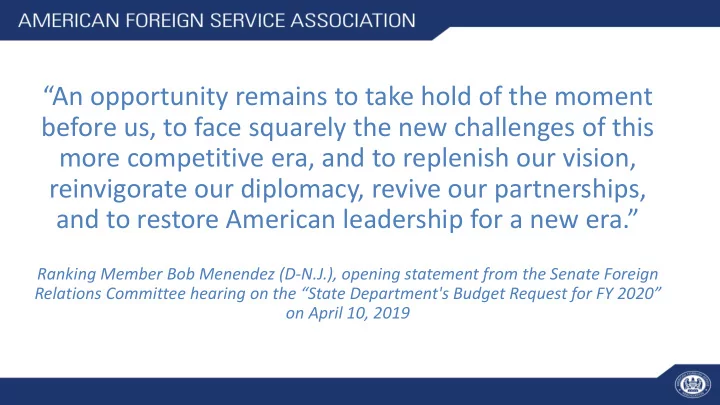

“An opportunity remains to take hold of the moment before us, to face squarely the new challenges of this more competitive era, and to replenish our vision, reinvigorate our diplomacy, revive our partnerships, and to restore American leadership for a new era.” Ranking Member Bob Menendez (D-N.J.), opening statement from the Senate Foreign Relations Committee hearing on the “State Department's Budget Request for FY 2020” on April 10, 2019
U.S. House of Representatives 235 Democrats 197 Republicans 3 Vacant
U.S. Senate By 2050, ~70% of the population will live in 15 states, meaning just ~30% of the U.S. 53 Republicans population selects 70 Senators. 45 Democrats 2 Independents
AFSA’s Committees of Jurisdiction Authorizing: Appropriating: • Senate Foreign Relations • Senate Appropriations Committee Committee – State Department/USAID – State and Foreign Operations Subcommittee Subcommittee • House Foreign Affairs • House Appropriations Committee Committee – State and Foreign Operations Subcommittee
Leadership on AFSA’s Committees of Jurisdiction Senate Foreign Relations Chair: Jim Risch (R-ID) Ranking Member: Bob Menendez (D-NJ) Senate State/USAID Subcommittee Chair: Johnny Isakson (R-GA) Ranking Member: Cory Booker (D-NJ) Senate Appropriations Chair: Richard Shelby (R-AL) Ranking Member: Patrick Leahy (D-VT) Senate SFOPS Appropriations Chair: Lindsey Graham (R-SC) Ranking Member: Patrick Leahy (D-VT) House Foreign Affairs Chair: Eliot Engel (D-NY) Ranking Member: Michael McCaul (R-TX) House Appropriations Chair: Nita Lowey (D-NY) Ranking Member: Kay Granger (R-TX) House SFOPS Appropriations Chair: Nita Lowey (D-NY) Ranking Member: Hal Rogers (R-KY)
Ongoing Operations Approps History (08-18)
“Just last month before the Chinese Parliament, Beijing presented a budget for 2019 that would increase foreign affairs spending by another 7.4 percent. American diplomats are already outnumbered five to one by Chinese diplomats doing economic and commercial work in Africa and elsewhere, and we hear from ambassadors of many of these countries who say to members of Congress, they would rather do business with the U.S., but they can't find us.” Sen. Jeanne Shaheen (D-N.H.), questioning Sec. Pompeo at the Senate State, Foreign Operations, and Related Program Subcommittee hearing on the “Review of the Fiscal Year 2020 Budget Request for the State Department” on April 9, 2019
“With countries like China and Russia working to undermine democratic values and respect for human rights, American leadership is more important than ever. This U.S.-led international order has helped populations across the globe enjoy safer, more stable, and more prosperous lives, and I believe American diplomatic engagement is critical to leaving a better world for the next generation.” Rep. Ann Wagner (R-Mo.), during her testimony at the Subcommittee on State, Foreign Operations, and Related Programs members’ day hearing, March 6, 2019
Economic Diplomacy Works: The Foreign Service Solution A field-forward Foreign Service is: • Readily Available: Existing mid-level FSOs can easily be shifted from Washington to overseas posts • Business Backed: Business has asked for more support from FSOs in embassies to enable them to compete and win in overseas markets • Administration Supported: Statements from Sec. of State Mike Pompeo support the “field - forward” approach • Cost Effective: Sending one FSOs abroad costs at most $300,000/head
“We need our people out there, working with our security partners, advancing human rights and the rule of law, and pushing for American business.” Chairman James Risch (R-Idaho), opening statement from the Senate Foreign Relations Committee hearing on the “State Department's budget request for FY 2020” on April 10, 2019
The Championing American Businesses Through Diplomacy Act The purpose of this bill is to foster commercial relations with foreign countries and support United States economic and business interests abroad in the conduct of foreign policy. “Foreign Service support for American business . . . is a major reason why the U.S. Foreign Service was created.’’
AFSA Advocacy Wins • Warded off proposed cuts to the International Affairs Budget • Included language requiring State to resume hiring, maintain staffing above specified floors • Reversed the decade-long decline in core diplomatic capability spending • Increased the “Overseas Programs” FY19 appropriations line item by $84 million, which funds the regional bureaus abroad and the costs of moving FSOs overseas
Recommend
More recommend